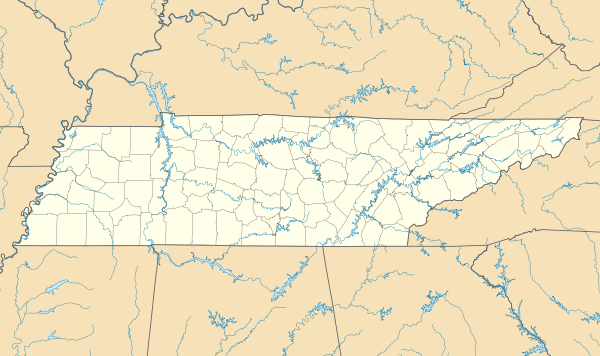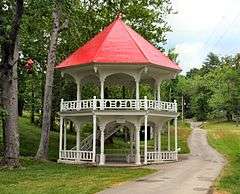Tate Springs Springhouse
|
Tate Springs Springhouse | |
|
Tate Springs Springhouse | |
  | |
| Nearest city | Bean Station, Tennessee |
|---|---|
| Coordinates | 36°20′18″N 83°20′44″W / 36.33833°N 83.34556°WCoordinates: 36°20′18″N 83°20′44″W / 36.33833°N 83.34556°W |
| Area | 3 acres (1.2 ha) |
| NRHP Reference # | 73001768[1] |
| Added to NRHP | April 13, 1973 |
Tate Springs Springhouse is a Victorian-style springhouse southwest of Bean Station, Tennessee, that is listed on the National Register of Historic Places.

The springhouse is one of the last remnants from Tate Springs Resort, a popular resort of the late 19th and early 20th centuries. A grand hotel, accommodating 500 guests, was built at the site after the Civil War by Samuel Tate, who had acquired 2,500 acres (1,000 ha) of land surrounding a mineral spring. In the late 1870s, an entrepreneur called Captain Thomas Tomlinson bought the property from Tate and expanded it into a "world-class resort" to take advantage of the mineral springs. Facilities included an elegant ballroom, a billiards room, riding stables, a swimming pool, tennis courts, a 100-acre (40 ha) park and an 18-hole golf course. In addition to hosting visitors at the resort, Tomlinson promoted Tate Springs mineral water as a curative and sold it by mail order under the name Tate Epson Water.
The resort had its peak popularity between the 1890s and 1920s, when the Knoxville and Bristol Railway, known as the "Peavine Railroad," provided passenger rail connections to the site.[2][3] The hotel was demolished in 1936.[4]
References
- ↑ National Park Service (2010-07-09). "National Register Information System". National Register of Historic Places. National Park Service.
- ↑ West, Carroll Van (1995). Tennessee's Historic Landscapes: A Traveler's Guide. University of Tennessee Press. pp. 166–167. ISBN 9780870498817.
- ↑ "History of Bean Station". Town of Bean Station, Tennessee. Retrieved January 6, 2014.
- ↑ "Visitors' Guide". Grainger County, Tennessee. Retrieved January 7, 2014.
